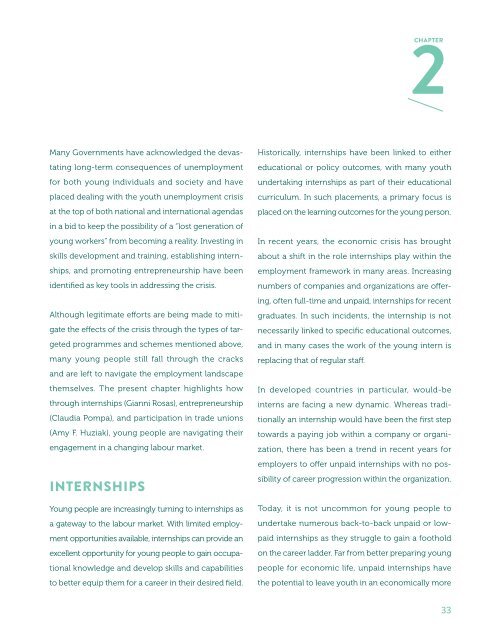YOUTH CIVIC
Zkdv303s4qX
Zkdv303s4qX
Create successful ePaper yourself
Turn your PDF publications into a flip-book with our unique Google optimized e-Paper software.
2CHAPTER<br />
Many Governments have acknowledged the devastating<br />
long-term consequences of unemployment<br />
for both young individuals and society and have<br />
placed dealing with the youth unemployment crisis<br />
at the top of both national and international agendas<br />
in a bid to keep the possibility of a “lost generation of<br />
young workers” from becoming a reality. Investing in<br />
skills development and training, establishing internships,<br />
and promoting entrepreneurship have been<br />
identified as key tools in addressing the crisis.<br />
Although legitimate efforts are being made to mitigate<br />
the effects of the crisis through the types of targeted<br />
programmes and schemes mentioned above,<br />
many young people still fall through the cracks<br />
and are left to navigate the employment landscape<br />
themselves. The present chapter highlights how<br />
through internships (Gianni Rosas), entrepreneurship<br />
(Claudia Pompa), and participation in trade unions<br />
(Amy F. Huziak), young people are navigating their<br />
engagement in a changing labour market.<br />
INTERNSHIPS<br />
Young people are increasingly turning to internships as<br />
a gateway to the labour market. With limited employment<br />
opportunities available, internships can provide an<br />
excellent opportunity for young people to gain occupational<br />
knowledge and develop skills and capabilities<br />
to better equip them for a career in their desired field.<br />
Historically, internships have been linked to either<br />
educational or policy outcomes, with many youth<br />
undertaking internships as part of their educational<br />
curriculum. In such placements, a primary focus is<br />
placed on the learning outcomes for the young person.<br />
In recent years, the economic crisis has brought<br />
about a shift in the role internships play within the<br />
employment framework in many areas. Increasing<br />
numbers of companies and organizations are offering,<br />
often full-time and unpaid, internships for recent<br />
graduates. In such incidents, the internship is not<br />
necessarily linked to specific educational outcomes,<br />
and in many cases the work of the young intern is<br />
replacing that of regular staff.<br />
In developed countries in particular, would-be<br />
interns are facing a new dynamic. Whereas traditionally<br />
an internship would have been the first step<br />
towards a paying job within a company or organization,<br />
there has been a trend in recent years for<br />
employers to offer unpaid internships with no possibility<br />
of career progression within the organization.<br />
Today, it is not uncommon for young people to<br />
undertake numerous back-to-back unpaid or lowpaid<br />
internships as they struggle to gain a foothold<br />
on the career ladder. Far from better preparing young<br />
people for economic life, unpaid internships have<br />
the potential to leave youth in an economically more<br />
33


